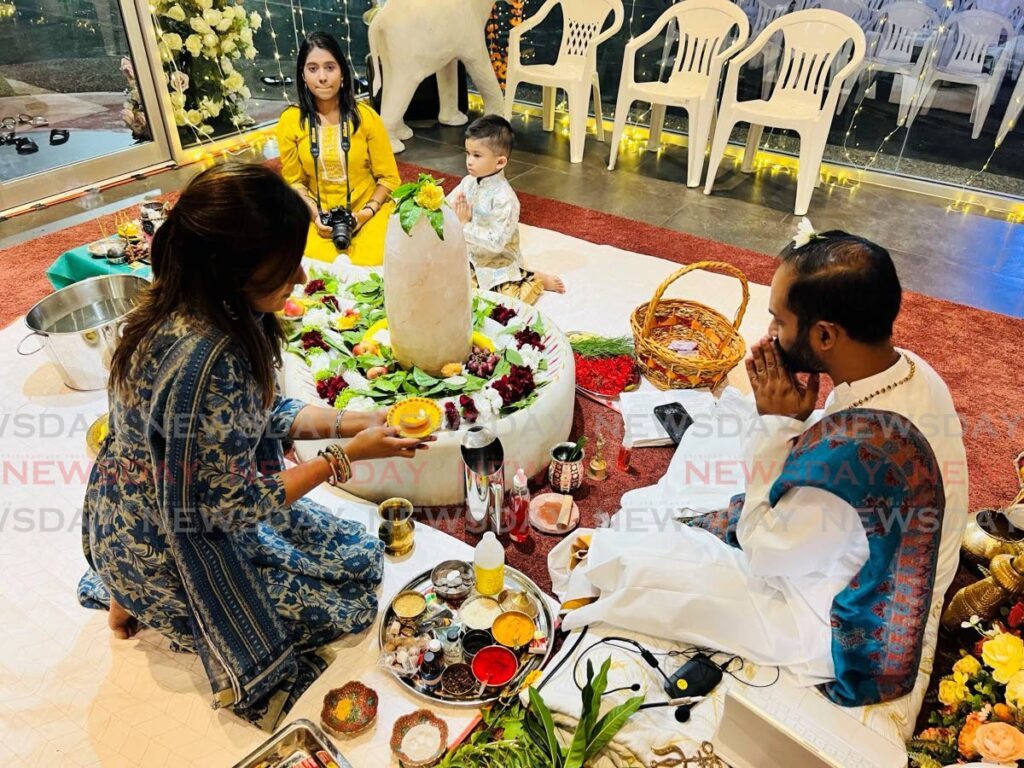Hindus celebrate Maha Shivratri with devotion, reflection

Bavina Sookdeo
Hindus across Trinidad and Tobago observed Maha Shivratri engaging in all-night vigils at temples with devotional songs and dances between Friday evening and Saturday morning.
Shivratri, known as the "Night of Lord Shiva," falls on the 14th day of the dark fortnight in the month of Phalgun (February/March), symbolising the manifestation of Lord Shiva as the Jyotir lingam (column of light).
Lord Shiva, one of the manifestations of the Hindu Trinity, embodies the roles of destroyer and rejuvenator. The festivities began at 6.16 pm on March 8 and concluded at 6.16 am on March 9
Throughout the night, devotees offered (in mandirs and at home) milk, dahee (yogurt), ghee, honey, bael leaves, sugarcane, till (sesame seeds), and flowers to the Shiva lingam at four intervals or prahars. A lingam is a sacred stone symbolising the unified energy of male and female, believed to be the source of all life.
Newsday interviewed devotees and pundits at different temples to gather their perspectives on Shivratri.

Pundit Satyanand Mahabir Dubey of the Tryambakeshwar Mahadev Mandir, at Caroni Savannah Road in Chaguanas, said he was pleased by the turnout of devotees.
"During the nights leading up to Shivratri, we had yagna, and every night it was well attended, about 300 people a night. It was a mixed crowd. We had about a 40 per cent younger crowd (this year).”
Kishan Bhimull, the public relations officer of the Shri Ganesh Mandir located at the corner of Jokhan and Doorbassa Trace, San Francique Road, Penal, said people from sporting and cultural groups, outside of the community, came out to show their support.
Asked what Shivratri means to him, Bhimull said, "To me, Shivratri serves as a reminder of the wisdom and teachings of Bhagwan Shiva, about how I can lead a more fulfilling and meaningful life to those most dear to me, as it encourages me to deepen my connection with Bhagwan Shiva."
Bhimull related that he spent the evening praying with family at home, followed by worship at the Shri Ganesh Mandir. "Prayers at home is actually a cherished tradition which gives me the opportunity to foster unity, love, and a spiritual connection within the household, where we share moments of gratitude and reflection and strengthen our bond with each other and with Bhagwan Shiva," he said.
"Shivratri" he added, "teaches us resilience in the face of adversity, and to have the courage to confront and overcome obstacles in our lives. It symbolises the overcoming of darkness and ignorance, and the emergence of light and wisdom as it teaches us that no matter how challenging life may seem, there is always the potential for growth and positive change."
Devotee Anjely Rajkumar, who attended the Shri Ganesh Mandir, gave her perspective.
"Shivratri is a night filled with devotion to Lord Shiva, in my humble view. It is about mentally readying oneself to gain insight into inner spiritualisation through the process of gyaan (knowledge). We fast to achieve this. It is a time to give to charity and to pray for your life's goals to come true. Being a singer, one of the main ways I thank and honour Lord Shiva is by singing the different bhajans devoted to him. I consider myself very blessed to have this opportunity."
Rajkumar shared that during the night of Shivratri, she and her family offered dhar (an offering of water and/or other ingredients) on the lingam at their house and performed Japa (the repetitive chanting of a mantra).
“Following that, we go to several mandirs to join others in worship. As we visit many mandirs on the auspicious night, I regard this as a tirath (pilgrimage) in the hope of acquiring maximum blessings,” she said.
As for the lesson that Shivraatri teaches, Rajkumar said, "I believe that creation and destruction is the lesson that Shivratri imparts within. To elaborate, Lord Shiva is the creator as well as the destroyer. This dual function serves as a reminder that sometimes progress and fresh beginnings require destruction and occasionally letting go of the past allows for the emergence of something better."
At the Ramjit and Basso Persad Hindu Temple situated at Mohepath Trace in St Helena, the all-night vigil featured song, dance, bhajan (devotional songs), and various performances by Rana Mohip and Group, The San City Steel Orchestra, Kaveesh The Band, the Harry Persad and Sons Ltd's Nritya Sangam Dance Company, and more.
Speaking to Newsday, 16-year-old Vishal Surujdeo said he spent the night worshipping Lord Shiva by chanting his name via bhajans and by chanting the 108 names of Lord Shiva. He stated that to him, “Shivratri is a night in which devotees worship lord Shiva through music and chanting the name of the lord.” Questioned on what he thinks Shivratri teaches, the teenager said, “Lessons of devotion, self-discipline and spiritual enlightenment.”
Surujdeo’s brother, 18-year-old Rohan Surujdeo, also joined in the observance at the Ramjit and Basso Persad Hindu Temple. He noted that he celebrated with devotion and fasting. He added, “For me, Shivratri is a time for spiritual reflection, seeking blessings, participating in prayer, singing and the chanting of bhajans to the supreme lord, and simply enjoying the festive atmosphere with family and friends. It teaches us to overcome darkness with light, to persevere through challenges, and to seek inner peace and enlightenment. It emphasises the importance of mindfulness, detachment, and worshipping the divine Lord Shiva himself.”


Comments
"Hindus celebrate Maha Shivratri with devotion, reflection"